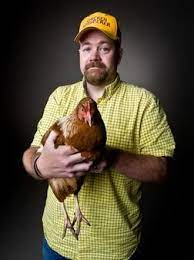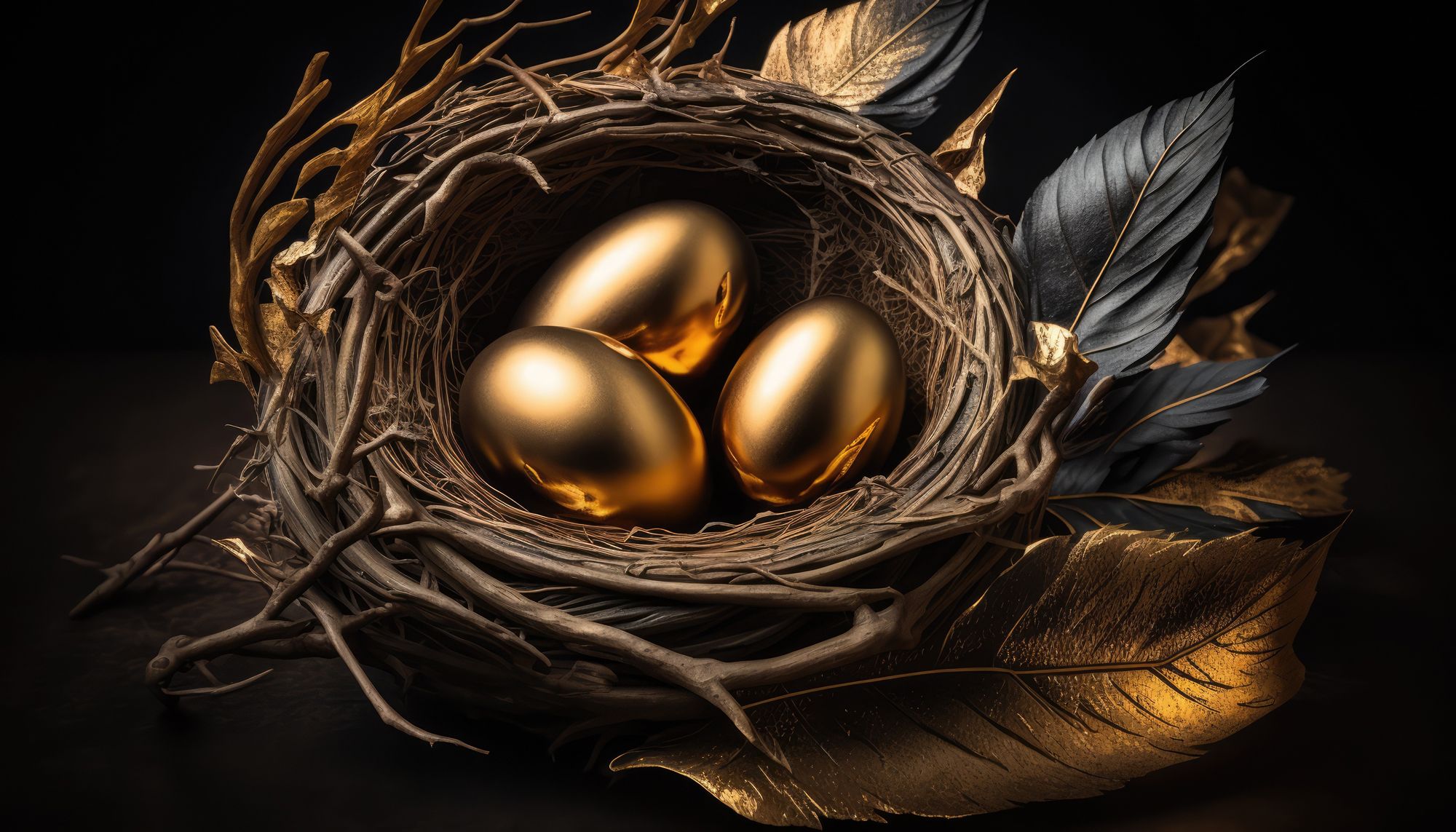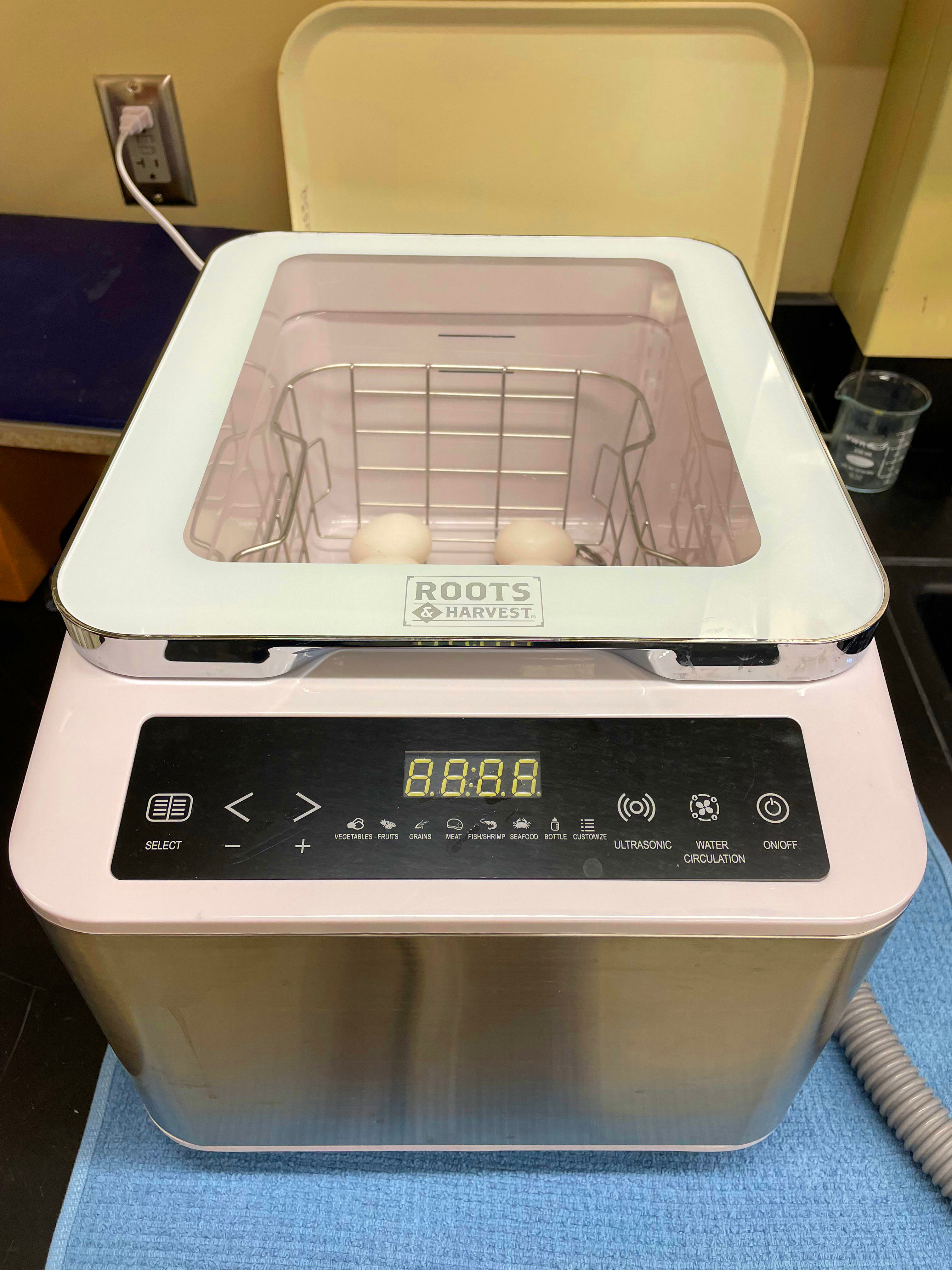Does Pumpkin Seed Work as a Dewormer?


Scientists put it to to the test
By Dr. Ruediger Hauck, Maria Terezza B. Terra, and Dr. Brigid McCrea
Every fall you start to see posts on Facebook and blogs about using pumpkin seed as a natural dewormer for chickens. But this popular claim begs the question as to whether or not the product actually works. Finally, research by the laboratory of Dr. Ruediger Hauck at Auburn University has answered this age old question.
Before telling the results, it’s important to understand how this experiment came together and what else was tested.
Meet the subjects involved
Most backyard flock owners have laying hens, so this study focused on this type. The breed used was the Single Comb White Leghorn.
Powdered pumpkin seed was used. The study also looked at another, much more commonly known plant that has a history of use as a dewormer (or vermifuge): Artemisia absinthium is otherwise known as wormwood.
Both ingredients were incorporated into the birds’ evenly so the chickens couldn’t pick out ingredients—we could be certain the birds were actually consuming the ingredient.
The powered pumpkin seed was included in the feed at a rate of 1% and the powdered wormwood was included at a rate of 0.02%.
What was the scientific process?
The laying hens were raised on a regular diet until they were 16 weeks old and then were placed in cages and the new diets were begun. One group was fed a control diet with no test ingredients.
When the chickens were 25 weeks old, half of the birds in each group were given a dose of 250 Ascaridia galli eggs. Ascaridia galli is a roundworm that affects the digestive tract of chickens and other poultry. Feces were collected regularly to see if the diets affected the amount of worm eggs in the droppings.
Additionally, adult worms were counted in the digestive tract to see if the diets affected their numbers. Chicken eggs were collected daily and tested to see if the treatments had any effect on the quality of the eggs. The study ended when the chickens were 35 weeks old.
The results
When it came down to counting the number of adult worms found in the digestive tract, the resulting numbers were low.
There was no statistical difference between any of the groups (Figure 1). So that means that the treatments of wormwood and pumpkin seed did not affect the number of adult worms in the gut. Unchallenged layers—the control group—did not have any adult worms in their digestive tract, either.
Next, the feces were collected regularly and tested for worm eggs. Worm eggs were counted as the number of eggs per gram of feces.
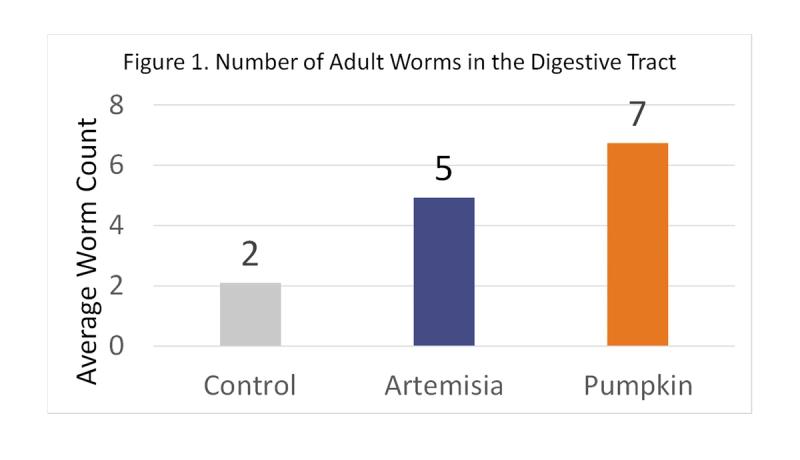
This is why the chickens were raised in cages; so that droppings could be collected. Chickens infect one another through the fecal-oral route, so when another chicken eats an infected chicken’s feces, the roundworm finds a new host.
The majority of worm eggs were detected between 5-9 weeks post-infection. There was no statistical difference between any of the groups (Figure 2). That means that the treatments of wormwood and pumpkin seed did not affect the shedding of worm eggs by adult worms in the gut. Unchallenged layers did not shed any worm eggs in their feces.
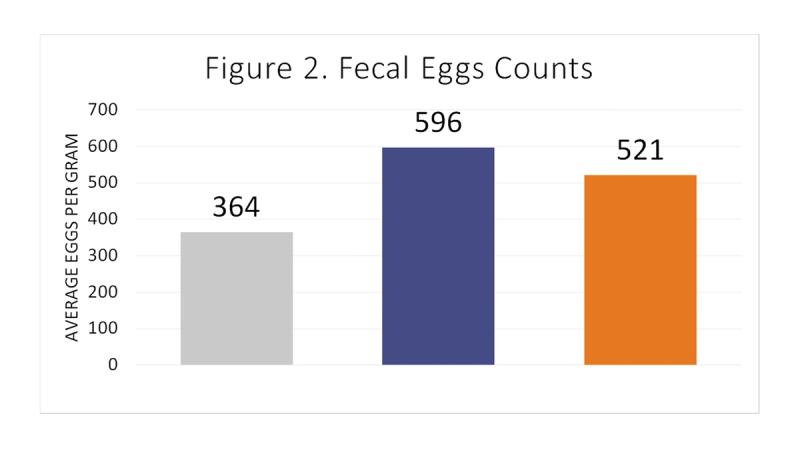
Figure 3 looks at the hens’ egg production before they were infected with roundworms. Until birds were 24 weeks old, the control group led the way in egg production. Egg production did not differ significantly among treatment groups, so it appears that adding wormwood and pumpkin seed did not have a negative effect.
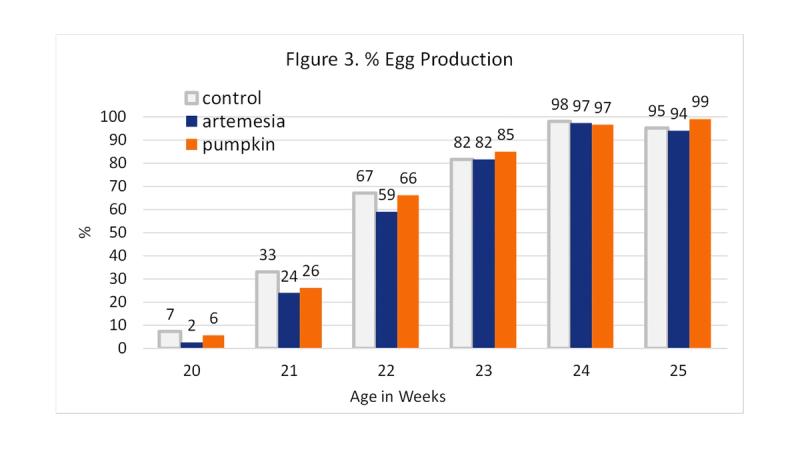
Figure 4 shows the percentage of egg production after the laying hens were dosed with roundworm eggs. As you can see, there were no significant changes between the groups. That means that even after the laying hens were infected with worm eggs, neither wormwood nor pumpkin seed had any effect on egg production.
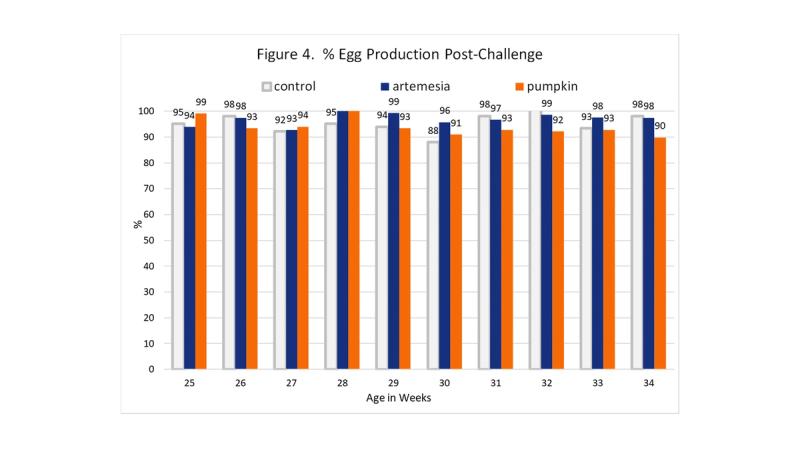
Table 1 shows how the egg production for the remainder of the trial stayed high regardless of which challenge group hens were in and regardless of which treatment group they were in. It appears that there may have been a very slight, but statistically not significant, trend toward lower egg production in the hens fed pumpkin seed in the diet and having been infected with roundworm eggs.
Figure 5 illustrates that the egg weights were not significantly different in any of the treatment groups—the tested ingredients did not appear to harm egg weights or egg size. Also, chickens challenged with roundworms did not appear to affect the size of the eggs laid.
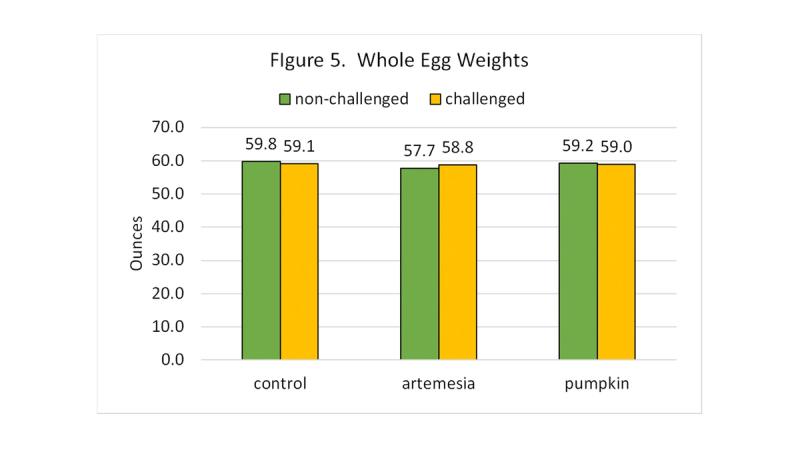
Figure 6 shows the Haugh Units, which is a measurement of the quality of the albumen or egg white, meaning its ability to perform adequately in recipe expectations and functional properties. It does not appear to harm the egg white protein and quality when adding wormwood or pumpkin seed into the diets. Also, the chickens being challenged with roundworms did not appear to affect the Haugh unit of the eggs.
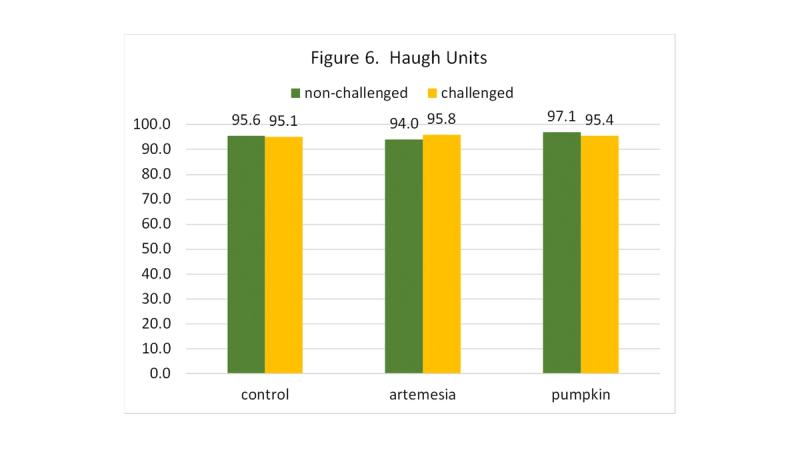
Figure 7 shows the yellowness or orange color of the yolk by assigning the color a number on the Roche color scale. A lower number is more of a pale yellow and a higher number is more orange. This was interesting to see since both the wormwood and pumpkin seed had the potential to add carotenoid pigments to the diet, therefore potentially making the yolks darker. The results indicate that there is no significant difference between yolk color in any of the treatment groups.
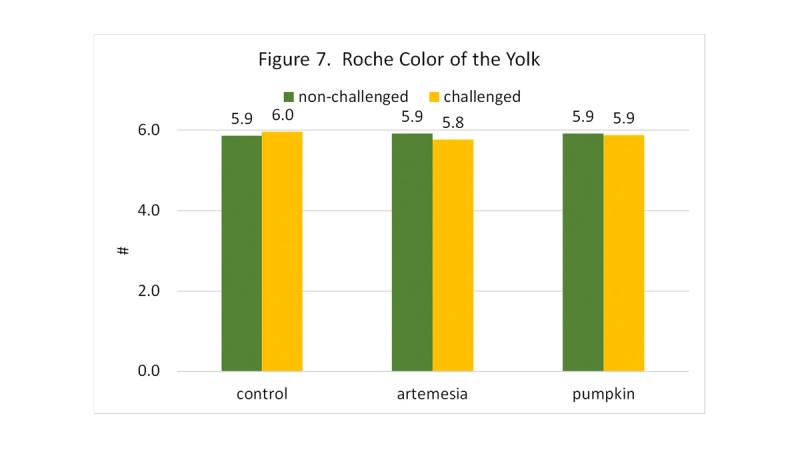
Lastly, Figure 8 indicates that the thickness of shells was measured. This is an important measurement because ingredients that cause shells to be thinner are likely to cause eggs to be lost in transport to the customer. In addition, thinner shells are more likely to have a higher percentage of moisture loss which translates to eggs that depreciate in interior quality faster.
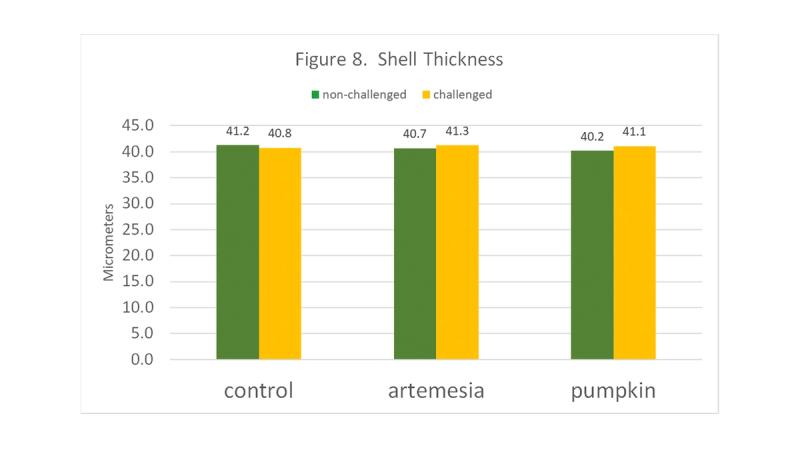
This was tested because we wanted to know if either the pumpkin seed or wormwood caused the shells to degrade in any way through thinning. The results indicate that the addition of wormwood and pumpkin seed did not have a deleterious effect on shell thickness.
So what does this all mean?
The addition of pumpkin seed and wormwood did not have a negative effect on egg production in the laying hens. However, the pumpkin seed and wormwood also did not have any beneficial effects on the number of worms in the digestive tract nor on the number of worm eggs shed in the feces of the chickens.
The final mojo:
the myth that pumpkin seed is a natural dewormer for chickens is BUSTED!
If your chickens are experiencing an infection by roundworms, then seek a veterinarian’s prescription in order to eliminate the problem. That way your chickens will not suffer any potential ill effects and your battle against the internal parasites will be a short and decisive one.
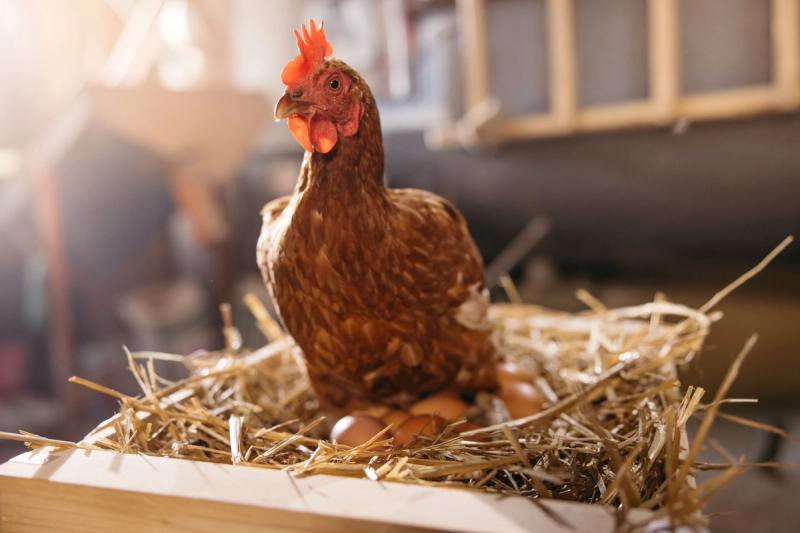
Tags:Plain Talk

Chicken Whisperer is part of the Catalyst Communications Network publication family.


